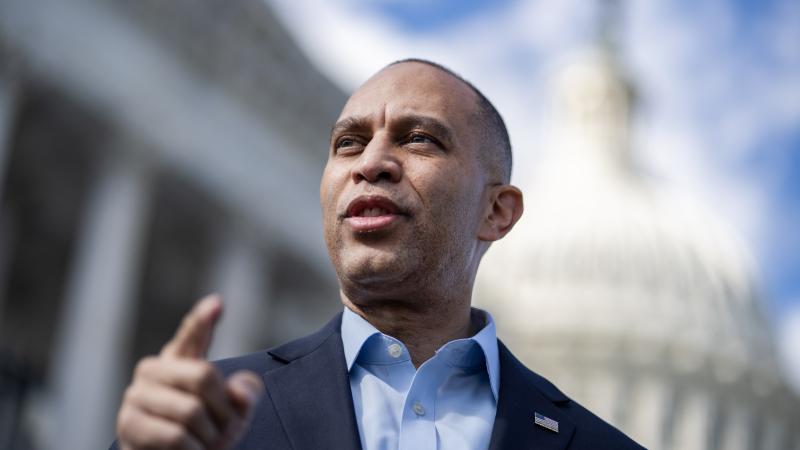Amid fear of Afghan refugee crisis, Greece, Hungary bolster borders, as Biden abandons wall
By halting construction on southern border wall, the administration is paying contractors "at least $3 million per day to guard steel, concrete, and other materials in the desert," Senate Republican report.
With an initial 35,000 Afghans slated to be flown to military bases in New Jersey, Wisconsin and Texas, other countries have enacted policies to block refugees from entering, including building walls to prevent illegal entry — even as the Biden administration's halt on construction of the U.S. border wall costs taxpayers $3 million per day, according to an estimate by Senate Republicans.
Greece announced that it recently completed a 24.85 mile wall along its border with Turkey and put in place a new surveillance system to stop potential asylum seekers from entering after the Taliban's takeover of Afghanistan.
Many in the European Union are afraid a flood of Afghans will overwhelm Europe, repeating the 2015 refugee crisis, when nearly one million people fleeing war, poverty and chaos in the Middle East crossed into Greece to get to other countries.
"In 2014, when waves of refugees began flooding into western Europe, citizens and officials alike responded with generosity and openness," recounted Cheryl Benardin a 2017 article for the National Interest. "Exhausted refugees spilled out of trains and buses to be met by crowds bearing gifts of clothing and food, and holding up placards that read 'Welcome Refugees.'"
What followed was a wave of sexual assaults committed by refugees against local women, according to numerous reports in multiple countries. "Most of the assaults were being committed by refugees of one particular nationality: by Afghans," wrote Benard, currently president of Alliance for the Restoration of Cultural Heritage (ARCH) International, a research and advocacy non-profit dedicated to the support of cultural activism, specifically in post-conflict situations.
With concerns about immigration and crime, Greece says it doesn't want to be the gateway to Europe allowing Afghans or anyone else in, Citizens' Protection Minister Michalis Chrysochoidis, recently explained. "We cannot wait, passively, for the possible impact," he told reporters. "Our borders will remain safe and inviolable."
Greece expanded the construction of its border wall, including adding a hi-tech, automated electronic monitoring system. It also fenced off its migrant camps and is in the process of building two closed-type facilities on the islands of Samos and Lesvos, which are near Turkey.
Meanwhile, Hungary also built a new high-tech electric fence to prevent refugees from entering. In addition to having heat sensors and cameras, the barrier is equipped with loudspeakers. "Attention, attention: I'm warning that you are the Hungarian border," a voice announces. "If you damage the fence, cross illegally, or attempt to cross, it's counted to be a crime in Hungary. I'm warning you to hold back from committing this crime. You can submit your asylum application at the transit zone."
Hungary also found itself inundated by mostly single men from Muslim countries in 2015. In response, the government enacted tough immigration laws, put up a razorwire fence and increased border patrol efforts. But its new floodlit fence is made of wire reinforced with steel and is being extended another 85 miles along the Hungarian-Serbian border. Roughly 700 prison inmates are building the remainder of the fence, which is expected to be completed in two months.
Meanwhile, border patrol agents prevent hundreds of illegal crossings every day, and at border posts only 10 people per day are allowed to attempt to enter legally.
Hungarian Prime Minister Viktor Orban maintains that mass immigration from the Middle East and Africa is an existential threat to Hungary's way of life. The majority of Hungarians agree, opposing forced migration and resettlement, according to a survey conducted by the Szazadveg Foundation.
"Our fiercest opponents are not the Hungarian opposition parties, they reside abroad," Orban has said. "The Hungarian government — and Hungary — can be brought down from Washington, Berlin and Brussels."
Meanwhile, in Washington, D.C., Biden administration and House Democrats have taken an opposite approach, defunding border security, reversing Trump-era policies, ignoring or selectively enforcing immigration laws passed by Congress and implementing policies effectively opening the southern border.
The Department of Homeland Security returned more than $10 billion allocated to border wall construction to the Department of Defense.
In July, the House passed a budget for DHS which cuts Customs and Border Patrol funding by $900 million and provides no additional funding for besieged Border Patrol agents.
More than $2 billion from prior appropriations to complete the construction of the border wall was rescinded, and $1.9 billion in congressionally appropriated DHS money was redirected to prioritize environmental restoration and site cleanup. This includes $100 million previously approved for border wall construction to be spent on "mitigation activities" involving vegetation restoration.
Rep. Ashley Hinson (R-IA) was among the many House Republicans criticizing the bill. "So where is this money going when it's ripped from CBP's anemic budget?" asked Hinson. "It is instead going to plants that have been trampled by illegal immigrants. It's certainly not being used as I believe it was intended to be used, which is to secure our border."
Texas Republican Rep. Chip Roy has called for the impeachment of DHS Secretary Alejandro Mayorkas and President Biden, and Rep. Andy Biggs (R-Arizona) has filed articles of impeachment citing failure to secure the border as a dereliction of duty.
Under the Trump administration, a record 450-plus miles of new steel barriers was constructed along the U.S.-Mexico border, with plans to build an additional 300 miles. Biden halted construction, leaving unfinished gaps in the wall and piles of materials abandoned on the ground.
Biden's DHS budget cuts funding for "Border Security Assets and Infrastructure" by 96% (from $1.5 billion in fiscal 2021 to $54.3 million for fiscal 2022), eliminating $1.375 billion for the Border Wall System Program.
Meanwhile, because the federal government is still under contract with companies to complete the construction taxpayers are stuck footing the bill — initially at a rate of $6 million per day, although those costs were later cut in half after contractors laid off construction workers.
"President Biden is paying professional construction contractors to babysit metal to the tune of $2 billion and counting, while at the same time we've seen a 20-year high number of migrants crossing our open border," Sen. James Lankford (R-Okla.), said in a statement.
"It is absolutely absurd that Americans are paying contractors to guard metal gates that President Biden refuses to install because he wants to 'study' the wall," said Lankford, ranking member of the Senate Subcommittee on Government Operations and Border Management.
"Biden's efforts to suspend or terminate border wall construction have cost taxpayers between $1.837 billion to $2.087 billion since January 20, 2021," according to a report by subcommittee Republicans released last month. "This amount continues to increase by at least $3 million per day."
The administration is paying contractors "at least $3 million per day to guard steel, concrete, and other materials in the desert," as the report put it. "At the same time, U.S. Customs and Border Protection (CBP) has encountered over 1.1 million migrants along the Southwest border this fiscal year — a 20 year high."
In response to the report, the Pentagon issued a statement saying the Defense Department "will not comment publicly on matters that are in active litigation or settlement discussions."
More than 1.1 million people from over 150 countries have come through the southern border illegally in the first six months of this year. This number excludes those who evade capture. Border Patrol has also reported historic numbers of drug and human smuggling apprehensions since January, both at 20-year highs.















